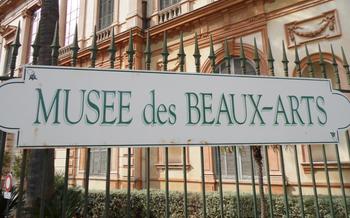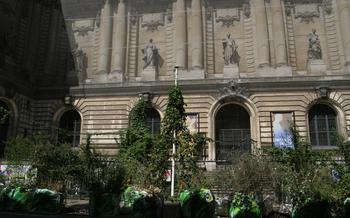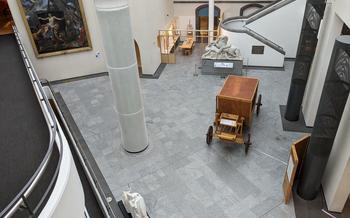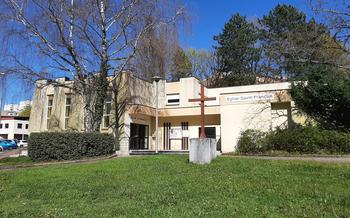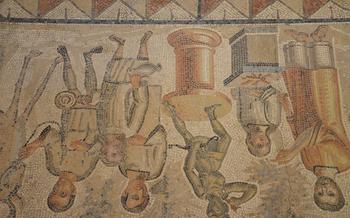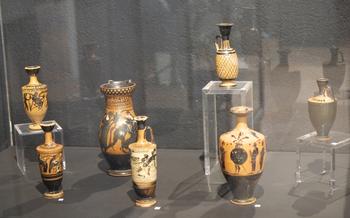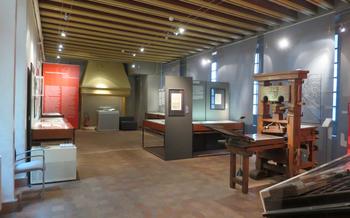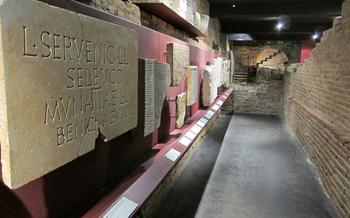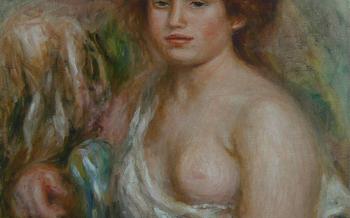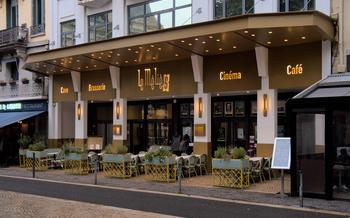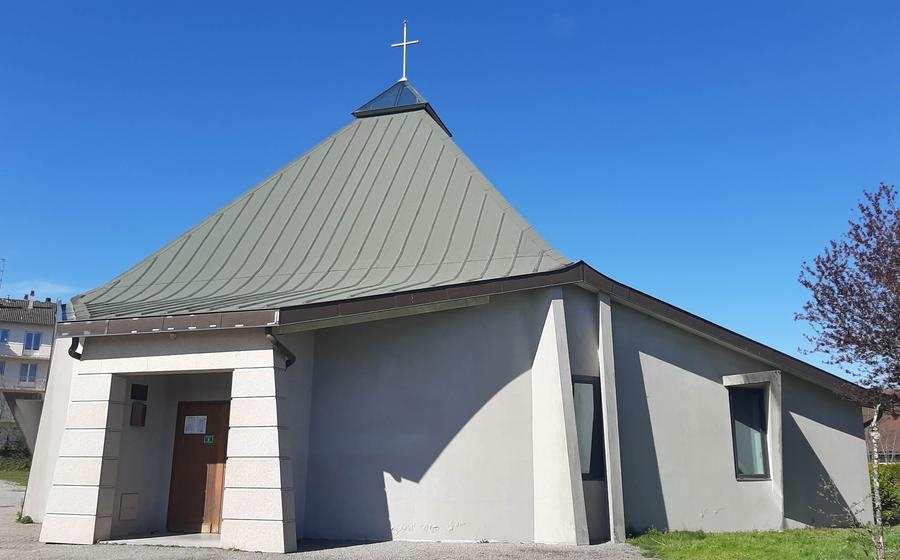
Couvent des Jacobins
- Historical Significance
- Architectural Masterpiece
- Museum of Fine Arts
- Exhibitions and Events
- Guided Tours
- Self-Guided Exploration
- Accessibility
- Hours of Operation and Admission Fees:
- Location and Transportation
- Photography and Social Media
- Souvenirs and Gifts
- Dining Options
- Family-Friendly Activities
- Accessibility for Visitors with Disabilities:
- Insider Tip:
Historical Significance
The Couvent des Jacobins, a former Dominican monastery, stands as a testament to the rich religious and cultural heritage of Limoges. Founded in the 13th century, it played a pivotal role in the city's spiritual and intellectual life. The monastery's architecture showcases a blend of Romanesque and Gothic styles, reflecting the evolving artistic influences of the era. Notable historical figures, including Pope Clement VI and Jean de la Cassière, are associated with the Couvent des Jacobins, adding to its historical significance.
Architectural Masterpiece
The Couvent des Jacobins stands as a testament to the grandeur of Gothic architecture. Its rib vaults, soaring to impressive heights, create a sense of awe and wonder. The pointed arches, a defining feature of Gothic style, add to the verticality of the structure, drawing the eye upward. Flying buttresses, essential for supporting the weight of the walls, lend a sense of lightness and elegance to the exterior.
The cloister, a serene oasis within the convent, is adorned with intricate carvings that depict biblical scenes and allegorical figures. The delicate tracery and intricate details showcase the skill and artistry of the medieval craftsmen. The cloister provides a peaceful retreat, inviting visitors to pause and reflect amidst the beauty of their surroundings.
The church, the heart of the convent, is a treasure trove of Gothic art. Stained glass windows bathe the interior in a kaleidoscope of colors, casting a mystical glow on the sacred space. Ornate sculptures, depicting saints, angels, and biblical narratives, adorn the walls and columns, adding to the rich visual tapestry of the church.
The Couvent des Jacobins has undergone meticulous restoration efforts to preserve its architectural integrity. These efforts have ensured that this architectural masterpiece continues to stand as a testament to the skill and devotion of its builders, a living reminder of the rich heritage of Limoges.
Museum of Fine Arts
Housed within the historic walls of the Couvent des Jacobins, the Musée des Beaux-Arts de Limoges is a treasure trove of artistic wonders. Its diverse collection spans centuries, showcasing masterpieces from the Middle Ages to the contemporary era. Visitors can admire a rich array of paintings, sculptures, and decorative arts that reflect the region's artistic heritage and the evolution of artistic styles over time.
The museum's collection boasts works by renowned artists such as Pierre-Auguste Renoir, Alfred Sisley, and Camille Corot, as well as local Limousin artists like Léonard Leymonerie and Charles-François Daubigny. Visitors can trace the development of painting techniques and artistic movements, from the delicate brushstrokes of the Impressionists to the bold colors and abstract forms of modern and contemporary art.
Among the highlights of the collection is the series of tapestries known as the "Apocalypse of Angers," woven in the 14th century. These intricate tapestries depict scenes from the Book of Revelation, offering a glimpse into the medieval imagination and the power of storytelling through textiles. The museum also houses a collection of Limoges enamels, a renowned art form that flourished in the region during the Middle Ages and Renaissance. These exquisite enameled objects, often featuring religious or mythological scenes, showcase the skill and artistry of local craftsmen.
With its diverse collection and stunning setting, the Musée des Beaux-Arts de Limoges offers visitors a journey through time and artistic expression. It is a must-visit for art enthusiasts and anyone interested in exploring the rich cultural heritage of Limoges and the Limousin region.
Exhibitions and Events
The Couvent des Jacobins hosts a variety of temporary exhibitions and cultural events throughout the year, adding a dynamic dimension to its offerings. These exhibitions often showcase the work of local and international artists, providing a platform for contemporary artistic expression. They explore diverse themes, from painting and sculpture to photography and mixed media, offering visitors a fresh perspective on art and culture.
The events held at the Couvent des Jacobins contribute to the cultural vitality of Limoges. Concerts, lectures, workshops, and performances bring together artists, scholars, and the public, creating a space for dialogue and exchange. These events foster a sense of community and encourage visitors to engage with the convent's rich history and heritage in new and innovative ways.
Upcoming exhibitions and events at the Couvent des Jacobins include a retrospective of the works of renowned local artist Pierre Soulages, a photography exhibition showcasing the hidden corners of Limoges, and a series of concerts featuring classical, jazz, and contemporary music. These events promise to captivate visitors and offer a truly immersive cultural experience.
Guided Tours
To fully appreciate the history and architectural intricacies of the Couvent des Jacobins, consider booking a guided tour. Knowledgeable historians or docents will lead you through the monastery's corridors, cloisters, and church, sharing fascinating stories and insights that bring the past to life. These tours offer a deeper understanding of the Dominican order's influence on Limoges and the artistic and cultural significance of the convent.
Guided tours are available in various formats, catering to different interests and group sizes. General tours provide a comprehensive overview of the convent's history and architecture, while thematic tours focus on specific aspects, such as the cloister's symbolism or the stained glass windows' artistry. For a more personalized experience, private tours can be arranged for individuals or small groups.
Booking a guided tour is simple and can be done in advance through the Couvent des Jacobins website or by contacting the tourist information office in Limoges. Prices vary depending on the type of tour and the number of participants, but generally offer excellent value for the wealth of knowledge and insights gained.
Self-Guided Exploration
Visitors who prefer a more independent experience can explore the Couvent des Jacobins at their own pace. A detailed map or guidebook is available to help navigate the different areas of the convent, ensuring that you don't miss any hidden gems. Begin your self-guided tour in the serene cloister, where intricate carvings adorn the graceful arches. Admire the stunning stained glass windows in the church, which bathe the interior in a kaleidoscope of colors.
Take your time to explore the Musée des Beaux-Arts, where a diverse collection of artworks awaits. From medieval masterpieces to contemporary creations, the museum offers a journey through the history of art. Don't miss the exquisite Limoges enamels, a specialty of the region. Audio guides and mobile apps are available to enhance your self-guided tour, providing insightful commentary and historical context.
Accessibility
The Couvent des Jacobins is committed to providing an accessible and inclusive environment for all visitors. The convent features a range of accessibility features to ensure that visitors with disabilities can fully enjoy their visit.
Wheelchair ramps and elevators are available throughout the convent, allowing visitors to navigate the different levels with ease. Accessible restrooms are also available for the convenience of visitors with disabilities.
The Musée des Beaux-Arts, housed within the convent, is also fully accessible. All exhibition spaces are wheelchair accessible, and there are tactile exhibits and audio guides for visitors with visual impairments.
For visitors with hearing impairments, assistive listening devices are available upon request. The convent staff is also trained to communicate effectively with visitors who are deaf or hard of hearing.
To ensure the best possible experience, visitors with disabilities are encouraged to contact the Couvent des Jacobins in advance to discuss their specific needs. The convent staff is happy to assist with any arrangements or accommodations to make sure that every visitor has an enjoyable and memorable visit.
Hours of Operation and Admission Fees:
The Couvent des Jacobins is open to the public every day except Tuesday. The hours of operation vary depending on the time of year. From April to October, the convent is open from 10 am to 6 pm. From November to March, the hours are from 10 am to 5 pm.
Admission fees for the Couvent des Jacobins and the Musée des Beaux-Arts are affordable. A standard ticket costs €7 for adults, €5 for students and seniors, and free for children under 1Family tickets are also available for €15, which admit two adults and two children.
Visitors can purchase tickets online or at the convent's ticket office. The convent also offers guided tours for an additional fee. Guided tours are available in French and English and last approximately one hour.
It's worth noting that the Couvent des Jacobins offers free admission on the first Sunday of every month. This is a great opportunity for budget-conscious travelers to visit the convent without paying an admission fee.
Location and Transportation
The Couvent des Jacobins is conveniently located in the heart of Limoges, at 5 Place des Jacobins. Visitors can easily reach the convent by public transportation, as it is served by several bus lines that stop nearby. For those arriving by car, there are several parking options available in the vicinity, including the Parking de la Cathédrale and the Parking des Halles.
Once you arrive at the Couvent des Jacobins, you will find yourself in a charming neighborhood surrounded by historical landmarks, shops, and restaurants. The convent is just a short walk from the Cathédrale Saint-Étienne de Limoges, another must-see attraction in the city. You can easily spend a day exploring the Couvent des Jacobins and the surrounding area, immersing yourself in the rich history and culture of Limoges.
Photography and Social Media
The Couvent des Jacobins encourages visitors to capture and share their experiences through photography. Visitors are welcome to take photos for personal use, but they are asked to be respectful of other visitors and the artwork on display. Flash photography and tripods are not permitted inside the convent.
Visitors are encouraged to share their photos and experiences on social media using the hashtags #CouventdesJacobins and #MuseeLimoges. The convent also has official social media accounts on Facebook, Instagram, and Twitter, where visitors can find updates on upcoming exhibitions, events, and special promotions.
Through social media, the Couvent des Jacobins aims to connect with a wider audience and promote its rich history and cultural significance. Visitors can use social media to share their impressions of the convent, ask questions, and engage with other visitors from around the world.
Souvenirs and Gifts
The Couvent des Jacobins is home to a charming gift shop where visitors can purchase a variety of souvenirs, books, and other items to commemorate their visit. From postcards and magnets featuring stunning images of the convent's architecture to unique replicas of medieval artifacts, the gift shop offers a range of items that cater to every taste and budget.
One of the highlights of the gift shop is the selection of books on the history, architecture, and art of the Couvent des Jacobins. These books, written by renowned scholars and historians, provide visitors with an in-depth understanding of the convent's rich cultural and historical significance.
Proceeds from the gift shop play a vital role in supporting the preservation and maintenance of the Couvent des Jacobins. By purchasing a souvenir from the gift shop, visitors not only take home a tangible memory of their visit but also contribute to the ongoing conservation efforts of this magnificent historical monument.
The gift shop also offers a range of unique and exclusive products that cannot be found anywhere else. From hand-crafted jewelry inspired by the convent's stained glass windows to artisanal ceramics featuring intricate medieval motifs, these exclusive items make for cherished keepsakes or thoughtful gifts for loved ones back home.
The Couvent des Jacobins gift shop is a treasure trove of unique souvenirs and gifts that offer a tangible connection to the convent's rich history and cultural heritage. Whether you're looking for a memento to remember your visit or a special gift for someone special, the gift shop is sure to have something to suit your needs.
Dining Options
After exploring the Couvent des Jacobins and the Musée des Beaux-Arts, visitors can satisfy their culinary cravings at any of the delightful dining establishments in the surrounding area. From cozy cafés to elegant restaurants, Limoges offers a diverse range of options to suit every taste and budget.
For a quick bite or a leisurely coffee break, visitors can head to the charming Café de la Poste, located just a short walk from the convent. This historic café offers a warm and inviting atmosphere, along with a selection of sandwiches, pastries, and beverages.
Those seeking a more substantial meal can choose from several nearby restaurants. La Table de Xavier, known for its innovative and refined cuisine, is an excellent choice for a special occasion. Alternatively, L'Auberge Saint-Martial offers a menu of traditional French dishes with a modern twist.
For those with a sweet tooth, the patisserie Boulangerie Pâtisserie La Huche à Pain is a must-visit. This artisanal bakery offers an array of delectable pastries, cakes, and breads, all made with fresh, local ingredients.
To fully immerse themselves in the local culinary scene, visitors can time their visit to coincide with one of Limoges' many food festivals. The annual Fête de la Fraise, held in June, celebrates the region's famous strawberries with a variety of events and tastings. The Marché de Noël, held in December, offers a festive atmosphere and a chance to sample traditional holiday treats.
A culinary journey through Limoges is not complete without trying the region's signature dishes, such as pâté de pommes de terre, a savory potato pie, or tourtous, a type of flatbread topped with walnuts and raisins. Visitors can find these local delicacies at many of the restaurants and bakeries near the Couvent des Jacobins.
Family-Friendly Activities
The Couvent des Jacobins and the Musée des Beaux-Arts are welcoming destinations for families with children. The museum offers a variety of educational programs and activities designed to engage young visitors in the world of art and history. These programs include workshops, guided tours, and scavenger hunts that make learning fun and interactive. Families can also explore the convent's cloister, with its serene atmosphere and intricate carvings, which provide a perfect backdrop for storytelling and imaginative play. Additionally, the museum has a family-friendly space where children can relax, draw, and play while their parents enjoy the exhibitions.
Accessibility for Visitors with Disabilities:
The Couvent des Jacobins is committed to providing an accessible and welcoming environment for visitors with disabilities. The convent features ramps, elevators, and accessible restrooms throughout the premises, ensuring that all visitors can navigate the site with ease and comfort. Visitors who require additional assistance or have specific accessibility needs are encouraged to contact the convent in advance to inquire about special programs or services that can be arranged. The friendly and knowledgeable staff is always ready to provide assistance and ensure that every visitor has a fulfilling and memorable experience at the Couvent des Jacobins.
Insider Tip:
For an unforgettable experience, plan your visit to coincide with the annual "Nuits des Cathédrales" festival, held every summer in Limoges. During this magical event, the Couvent des Jacobins and other historic landmarks in the city are illuminated with stunning light projections and sound effects, creating a captivating nocturnal spectacle. Immerse yourself in the enchanting atmosphere as the convent's facade comes alive with vibrant colors and animations, transforming it into a canvas of light and shadow. This unique festival is a feast for the senses, offering a fresh perspective on the architectural wonders of Limoges.
